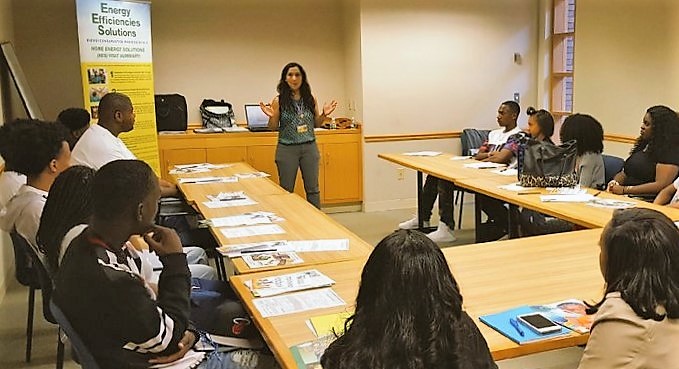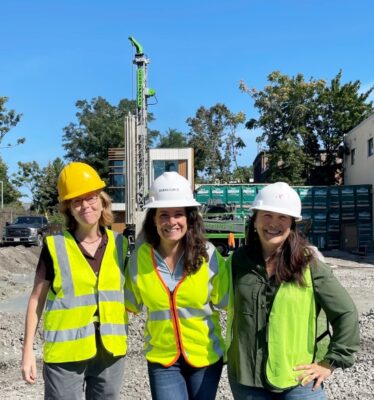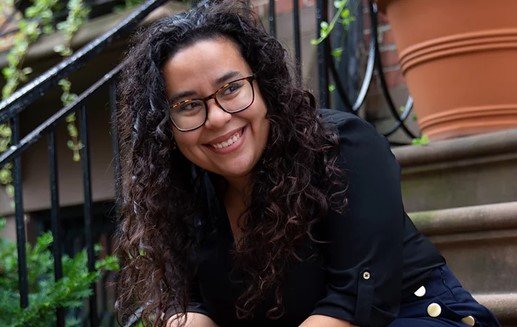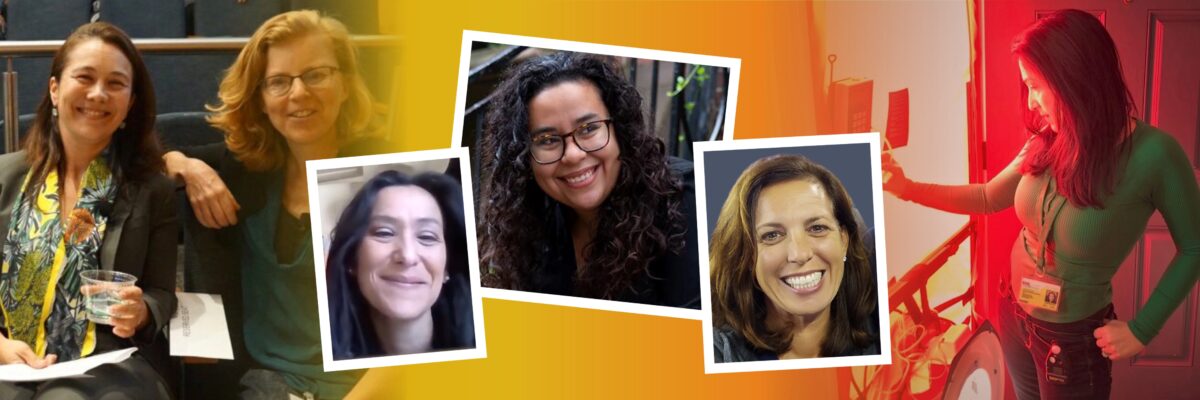by Carina Wallack
“As a Latina-mom, an entrepreneur, an employer, and a community member, I am always looking to expand access for people like myself,” says Leticia Colon de Mejias, who started Energy Efficiencies Solutions in Connecticut. She’s right. Greater access to the energy efficiency industry is needed.
For Women’s History Month, I want to highlight women driving progress in the energy efficiency industry. I was lucky to connect with generous leaders in the Northeast U.S. who are making enormous contributions.
Leticia Colon de Mejias

Leticia Colon de Mejias, Founder and CEO, Energy Efficiencies Solutions
Leticia describes her career path as an “odd ball in my industry.” She was teaching in a hospital workforce program when she saw the documentary Kilowatt Ours and became alarmed about the dangers of mountaintop removal coal mining. Leticia was also concerned about cancer, asthma, and climate change resulting from fossil fuel extraction and use.
She explains, “The more I learned, the more I felt that I had to connect people with information that can save lives, protect health, and lower energy burdens.”
Leticia does just that. Her company provides energy assessments and performs upgrades such as adding insulation, air sealing, duct sealing, and window and door replacements. Energy Efficiencies Solutions employs 25 staff, most of whom are people of color.
“I am thankful for my work because it allows me to provide jobs to people in my community,” Leticia says, “and to ensure policies are updated to end systemic exclusionary workforce practices.”
Outside her work at Energy Efficiencies Solutions, Leticia is president of Green Eco Warriors, a nonprofit that provides youth leadership training on energy conservation. In 2015 she was selected for “Connecticut’s 50 Most Influential Latinos” and in 2014 she received Hartford Business Journal’s 40 under 40 award, among other honors.
(See Leticia’s full interview, photos and links.)

Leticia teaching a class on energy efficiency. Photo courtesy of Leticia Colon de Mejias.
Although diversity in energy efficiency is increasing thanks to work from dedicated professionals like Leticia, progress is slow going.
As of 2021, only 25% of the U.S. energy efficiency industry was comprised of women* and people of color remain significantly underrepresented in the industry with only 8.4% of professionals identifying as Black and 15% identifying as Hispanic. (Energy Efficiency Jobs in America 2021)
To raise up extraordinary women making significant contributions in energy efficiency, I contacted more leaders.
Audrey Schulman and Zeyneb Magavi

Audrey and Zeyneb (left and right) with Nikki Bruno (center) of Eversource. The women first met with Eversource in 2016. Photo: Lauren Justice
Audrey and Zeyneb are co-directors of HEET (Home Energy Efficiency Team) which formed in 2008. Their nonprofit is well-known for smart approaches to triage and transition away from Massachusetts’s heavy reliance on gas. A networked geothermal heating pilot is one such high-profile endeavor.
HEET was featured in The Boston Globe: What “distinguishes [HEET’s] proposal from other geothermal projects is that it would be managed by utilities, which would use their legal right of way to drill holes,” writes David Abel. Just this week, Canary Media also highlighted HEET’s pilot programs throughout Massachusetts.
The GeoGrid pilot, in Framingham, Massachusetts launching in 2022 with approved projects in National Grid and Eversource territories, can provide a successful example for other areas to provide safe, affordable heating without fossil fuels.
As mothers, both are concerned about climate impacts on their children and feel that individual actions are insufficient. Audrey is a 2021 Washington Post Climate Visionary for her work with leak-prone gas infrastructure. Read how gas utility executives “began as adversaries, but became allies” toward creating positive change. Listen to Audrey and Zeyneb discuss gas leaks and geothermal on AWESome EarthKind Podcast with Ron Kamen.
Kristin Dupre
Kristin is a vice president at Abode Energy Management, a lead vendor for the Mass Save Program. Abode focuses on residential building decarbonization. Among other endeavors, the firm provides consulting, training, and management of heat pump contractors.

Kristin is Vice President of Strategy and Development at Abode Energy Management.
“I really feel like I’ve found a home here,” Kristin says. “I’m aligned with the culture of the company and the values of their leadership team.”
Kristin has found it challenging at times to work in a male-dominated industry, and credits much of her success with support from other women.
“In the energy efficiency industry, there are a lot more men than women, especially at higher levels,” she says. “I have found that in parts of the industry where it’s more patriarchal, it is often challenging to be the only woman at a meeting or to have what you say not be heard, but then have a man say the same thing and [elicit] a positive reaction.”
She admits, “sometimes I even asked a man to present one of my ideas, because I thought it might get more traction.” Despite some negative experiences, Kristin is hopeful for a more diverse sector.
“There’s a strong network of women helping other women in this industry. That’s pretty awesome,” she says.
Kristin spent much of her career in finance, but eventually found her role as a manager and accountant to be limited and unfulfilling. She began her final finance manager job at an energy efficiency company, Conservation Services Group.
The company’s mission-driven programs inspired Kristin to pursue an MBA with a focus on sustainability. She completed her degree at Clark University in five years while working full time, by attending evening classes — and has worked in efficiency ever since.
(See Kristin’s full interview.)
Daphany Rose Sanchez
Daphany began her work in energy efficiency unintentionally. Describing herself as a proud Puerto Rican and Costa Rican native New Yorker, Daphany says she grew up in public housing, until in 2011 her family purchased a home on Staten Island. In 2012 Hurricane Sandy completely flooded that home. Daphany and her family had to be rescued by boat.

Daphany is Executive Director of Kinetic Communities Consulting.
In the aftermath of the superstorm Daphany saw firsthand how structural inequities – from hundreds of years of disinvestment, to unavailability of Spanish translation, to redlining – prevented families like hers from accessing essential home repairs.
She is now working to solve for historical disinvestment and inaction.
Daphany’s company, Kinetic Communities Consulting, works at the intersection of energy and affordable housing in New York City. The firm collaborates with nontraditional organizations who have been part of the communities’ ecosystem for decades, and bridges the gap between their sectors and the energy sector.
“The goal isn’t just to pump in money but to transform the existing ecosystem and market,” Daphany explains, “to show that custom approaches for diverse communities and communities of color are necessary to make sure communities are not left behind.”
Daphany completed an engineering degree at the NYU Tandon School of Engineering and a master’s degree in environmental policy and sustainability management at The New School’s Milano School. Along with her work at Kinetic Communities Consulting, Daphany serves as a board member of the Northeast Sustainable Energy Association and the Urban Homesteading Assistance Board, and participates in the American Council for an Energy-Efficient Economy’s equity working group. Daphany has received over a dozen honors; she was recently awarded the 2021 Real Estate/Construction 40 Under 40 and the Rachel’s Network Catalyst Award.
(See Daphany’s full interview, photos and links.)
The Future of the Industry
All these professionals agreed that a more diverse efficiency industry is needed to help us meet our climate goals – and to ensure everyone is included in the transition to a clean energy future. It’s an uphill battle, but work is already under way to create more opportunities in the sector.
Energy Efficiencies Solutions offers a highly successful on-the-job training program, and Leticia serves as a board member for the Building Performance Association (BPA). A national trade organization, BPA hosts a Career Center.
Abode Energy Management provides training resources including courses on building science, new construction, and energy-efficient technologies. Kinetic Communities Consulting provides paid fellowship programs for students; one of their current employees was a previous fellow.
Despite the obstacles these leaders have faced in their own careers, they are hopeful about the prospect of removing barriers for the next generation of energy efficiency professionals.
As Daphany puts it, “there is this conception that I struggled to get to this point, so the next generation has to struggle, too. But the next person shouldn’t have to go through the same struggle. People should be valued for who they are and the work that they are doing.”
Here’s to a stronger and more representative industry!
Thank you to the interviewees for your significant contributions to the clean energy industry, and for sharing your stories.
–Carina Wallack is a Senior Policy Analyst at E4TheFuture
*The Bureau of Labor Statistics lists/recognizes only male and female; we recognize that this does not represent all gender identities. This blog honors Women’s History Month specifically. We need greater representation of people of all gender identities/expressions to build the strongest possible energy efficiency sector.
